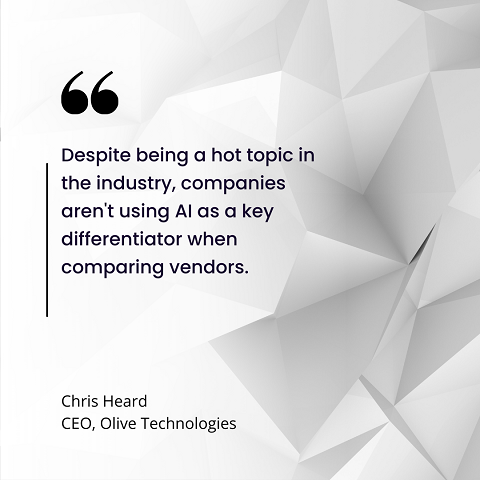IT Sourcing Trends Report Reveals More Focus on Data Than AIIT Sourcing Trends Report Reveals More Focus on Data Than AI
RFP solution provider Olive digs into what organizations really want from IT solutions.

In the ever-evolving landscape of enterprise technology, making informed decisions has become increasingly complex.
Recognizing this challenge, Olive, a leading request for proposal (RFP) solution for IT sourcing, has released its "Q2 2024 Technology Selection Data Report." This report offers an unprecedented look into the intricate decision-making processes of more than 700 organizations across various industries, shedding light on the true priorities and evaluation criteria driving their IT investments.
Among the top findings in the report:
Data and reporting are pivotal priorities for organizations.
Major software vendors with high market presence don't always make the shortlist.
AI is hyped but ranks low on actual requirements in RFPs.
Integration and mobile capabilities are in high demand.
"One of the biggest surprises in the report was seeing AI rank low in RFP requirements," Chris Heard, CEO at Olive Technologies, told ITPro Today. "Despite being a hot topic in the industry, companies aren't using AI as a key differentiator when comparing vendors."
Forget About AI — Organizations Are Prioritizing Tangible Outcomes
The report found that rather than AI being the dominant issue, data and reporting are much more prevalent themes.
That suggests that IT leaders are more focused on the tangible outcomes software can deliver rather than the underlying technology itself, according to Heard.
"This is great for business. It means they're seeing through the hype and prioritizing practical solutions that address their specific needs," he said. "However, it might not be the best news for the AI hype train, which has been generating significant buzz in recent years."

In Heard's view, the fact that companies are emphasizing data and reporting capabilities over AI functionality suggests a shift toward a more pragmatic approach to software selection.
"Businesses are looking for solutions that can help them harness the power of their data, generate valuable insights, and drive informed decision-making," he said. "While AI may play a role in enabling these outcomes, it appears that companies are more interested in the end results than the means by which they are achieved."
Looking forward, Heard said he'll be watching to see if AI will become a more critical factor in RFP requirements as the technology matures and its benefits become more clearly defined. But for now, businesses are prioritizing substance over style when it comes to their software needs.
"Companies are increasingly recognizing the strategic value of data and the importance of having the right tools and capabilities to analyze and interpret vast amounts of information effectively in real time," he said.
Big Name Vendors Are Not Always Selected
The analysis reveals that some major vendors have high market presence but low selection rates as finalists.
According to Heard, this discrepancy can stem from a number of factors:
Established brand reputation: Some companies are very well-established brands, but they may not prioritize innovation, often relying on their reputation to sell their products. As a result, these major players are frequently included in most RFPs, but when companies thoroughly evaluate the functionality and business use case fit, the deficiencies stemming from a lack of innovation become apparent, leading to low selection and shortlist rates.
Prioritization of marketing over product development: Smaller companies, in particular, may invest heavily in sales and marketing efforts, which can limit their budgets for product development and R&D. This approach leads to a company with significant online exposure and inclusion in popular analyst reports, but upon closer examination, they may not be able to deliver on specific needs.
Imbalance between market presence and product quality: Vendors face a challenge in striking the right balance between market presence and product quality. They need to ensure they are included in RFPs while also delivering a competitive solution.
To avoid being swayed by marketing hype, buyers should seek out unbiased reporting and insights to evaluate vendors and their solutions objectively, Heard said.
"Buyers should prioritize vendors demonstrating a commitment to innovation and product quality instead of those primarily focusing on marketing effort," Heard said. "Additionally, seeking references and reviewing case studies from current clients can offer valuable insights into how well the solutions perform and align with real-world scenarios and requirements."
About the Author
You May Also Like








.jpg?width=700&auto=webp&quality=80&disable=upscale)
